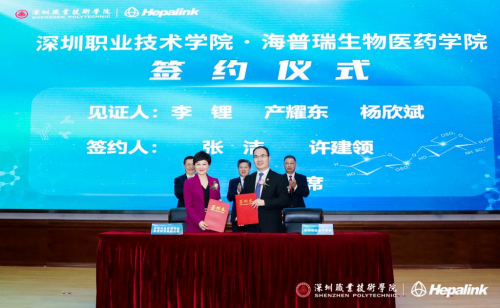
Leaders and Guests unveil the Hepalink Biomedical Science School.

Yang Xinbin hopes the School could become a paradigm for university-enterprise cooperation in vocational education in the field of biomedicine.

Xu Jianling and Zhang Jie signed the framework agreement on behalf of both sides.
On the afternoon of October 26, the signing and opening ceremony of Shenzhen's first distinctive industry college in biomedicine—Shenzhen Polytechnic·Hepalink Biomedical Science School—and the first summit forum of Hepalink Biomedicine College was held in Conference Room 1, Tongde Building, Liuxiandong Campus of Shenzhen Polytechnic. The event was attended by Chan Yaodong, deputy secretary-general of Shenzhen Municipal People's Government and first-class inspector; Zhang Tian, deputy director of Drug Department, Shenzhen Administration for Market Regulation; Wang Shaowen, deputy director of Biotechnology Division, Science, Technology and Innovation Commission of Shenzhen Municipality; Li Li, chairman of Hepalink Group and the group's Vice Presidents Shan Yu and Zhang Jie; He Zhendan, dean of College of Pharmacy, Shenzhen Technology University; Lu Xiyu, secretary-general of Shenzhen Pharmacist Association; Wang Yanmei, executive secretary general of Shenzhen Life Science and Biotechnology Association; Shenzhen Polytechnic's Party Secretary Yang Xinbin and President Xu Jianling. Vice President Wen Xidong of Shenzhen Polytechnic presided over the ceremony.
Building a Demonstrative Distinctive Industry College in Biomedicine Science and Technology in Guangdong-Hong Kong-Macao Greater Bay Area
At the signing ceremony, Xu Jianling and Zhang Jie signed a framework agreement on behalf of both sides, and leaders and guests jointly witnessed the ceremony and unveiled the college. At the ceremony, letters of appointment were issued to the president and directors of the first Council of the college, as well as the first president and vice president of the college.
Yang Xinbin said that biomedicine is bound to be the most popular emerging industry in the future global industry competition. Biomedicine, as one of the seven strategic emerging industries in Shenzhen, enjoys broad development prospects. There is a regular shortage of talent needed by innovative biomedical enterprises such as pharmaceutical R&D, quality management, and marketing. In 2020, the biomedical industry experienced a shortage of 250,000 talent, and the shortfall will grow to 450,000 in 2025. Since the establishment of the pharmacy major in 1997, Shenzhen Polytechnic has achieved fruitful results in running this major. The establishment of the Hepalink Biomedical Science School must be able to effectively consolidate the advantageous resources of the two parties to be the model of domestic university-enterprise cooperation in the field of biomedical vocational education and provide strong support of talent and intelligence for the development of the biomedical industry in Guangdong-Hong Kong-Macao Greater Bay Area.
Li Li regarded Hepalink as the well-deserved leading enterprise in every link of the whole industry chains of heparin. At present, Hepalink is China's largest pharmaceutical export enterprise for Enoxaparin Sodium Injection and the third-largest producer and vendor worldwide of the same medicine. As an innovative biomedical enterprise dedicated to providing high-quality, secure, and effective medicine and service for patients worldwide and protecting public health, the win-win cooperation will continuously provide biomedical technical talent to the Greater Bay Area. Ultimately, the cooperation will be a business card for Shenzhen Economic Model to provide referential values for more industry-university-research collaborations.
Making Joint Efforts on Biomedical Industry Talent Training, Technical Innovation, and Social Service
As the subject of the event, the first summit forum of Hepalink Biomedical Science School aroused a strong response among the participants. Guests delivered splendid speeches on the topics of the job-course-contest-certificate integration of biomedical talent, industry-education integration, talent training model reformation of distinctive industry college, and so on.
Lu Xiyu believes that the School can establish an industry standard in the future for vocational technique certification with practicability, comprehensiveness, and perspectiveness to bring forth new ideas and promote technical reformation. The School should strongly support the launching of vocational-technical contests, promotion of entrepreneurship, and education of job-hunting with emphasis on students' career planning education. Wang Yanmei analyzed the current situation, relevant policies, and cases of the biomedical industry-education integration. She proposed that the integration should be launched around the "four subjects" -- government, university, research institute, and enterprise -- to implement the "four matchings" -- course system and vocational capability, course standard and vocational standard, training project and job ability requirement, and teaching team and technical team, realizing the "four synchronizations" for developing industry allying with vocational education, retaining industrial characteristics with educational characteristics, reforming techniques with talent cultivating, and upgrading industry with teaching reforming. Shan Yu pointed out that continuously iterating technical innovation needs to be driven by substantial practical technical and skilled talent. Shenzhen Polytechnic plays the role of an industry benchmark and Hepalink as a biomedical enterprise with innovation as its mission. The cooperation between these two parties will give full play to their advantages respectively to establish the Hepalink Biomedical Science School, make joint efforts to cultivate talent with virtues of independence, self-improvement, self-esteem, and self-respect to introduce new energy to the development of the biomedical industry in Guangdong-Hong Kong-Macao Greater Bay Area.
It is reported that the Hepalink Biomedical Science School will implement the director responsibility system under the leadership of the board of directors, making mutual efforts on cultivating high-level biomedical talent, constructing high-quality majors, developing course standards, building double-position teachers teaching teams and world-advancing productive training centers, implementing Party building and new drug R&D, and launching social service and education on creation and entrepreneurship. The School will build a physical base of distinctive industry college operated in Pingshan District of Shenzhen in about five years. The college will be built as a model distinctive industry college in the field of biomedical technology in Guangdong-Hong Kong-Macao Greater Bay Area and highland with technical innovation and social service to effectively expand and improve the cultivating scale and quality of biomedical technical talent. In this way, the gathering and development of the biomedical industry in the Greater Bay Area will be accelerated.
(Text by Feng Jinjun, School of Food and Pharmacy Photo by Jian Jiayu, Publicity Department)
